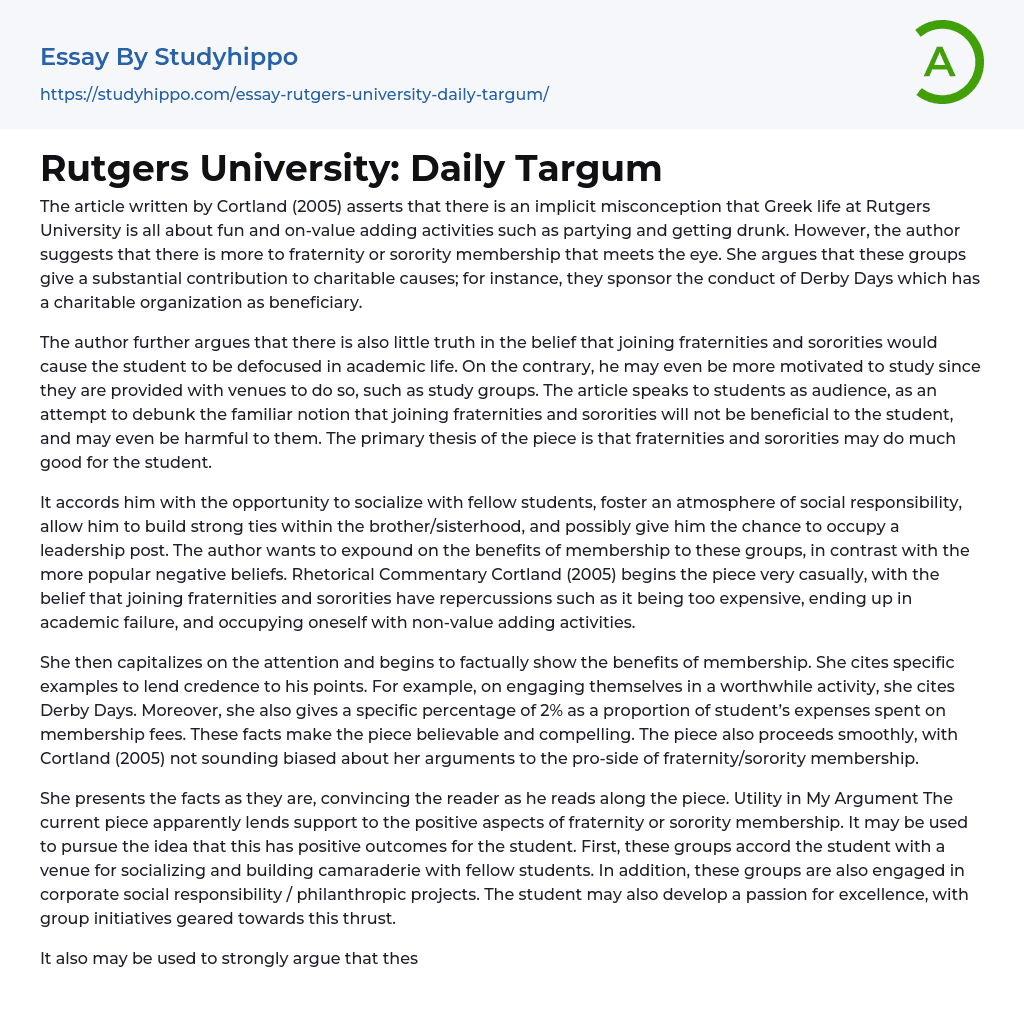The article written by Cortland (2005) asserts that there is an implicit misconception that Greek life at Rutgers University is all about fun and on-value adding activities such as partying and getting drunk. However, the author suggests that there is more to fraternity or sorority membership that meets the eye. She argues that these groups give a substantial contribution to charitable causes; for instance, they sponsor the conduct of Derby Days which has a charitable organization as beneficiary.
The author further argues that there is also little truth in the belief that joining fraternities and sororities would cause the student to be defocused in academic life. On the contrary, he may even be more motivated to study since they are provided with venues to do so, such as study groups. The article speaks to students as audience, as an attempt to debunk the fa
...miliar notion that joining fraternities and sororities will not be beneficial to the student, and may even be harmful to them. The primary thesis of the piece is that fraternities and sororities may do much good for the student.
It accords him with the opportunity to socialize with fellow students, foster an atmosphere of social responsibility, allow him to build strong ties within the brother/sisterhood, and possibly give him the chance to occupy a leadership post. The author wants to expound on the benefits of membership to these groups, in contrast with the more popular negative beliefs. Rhetorical Commentary Cortland (2005) begins the piece very casually, with the belief that joining fraternities and sororities have repercussions such as it being too expensive, ending up in academic failure, and occupying oneself with non-value adding activities.
She
then capitalizes on the attention and begins to factually show the benefits of membership. She cites specific examples to lend credence to his points. For example, on engaging themselves in a worthwhile activity, she cites Derby Days. Moreover, she also gives a specific percentage of 2% as a proportion of student’s expenses spent on membership fees. These facts make the piece believable and compelling. The piece also proceeds smoothly, with Cortland (2005) not sounding biased about her arguments to the pro-side of fraternity/sorority membership.
She presents the facts as they are, convincing the reader as he reads along the piece. Utility in My Argument The current piece apparently lends support to the positive aspects of fraternity or sorority membership. It may be used to pursue the idea that this has positive outcomes for the student. First, these groups accord the student with a venue for socializing and building camaraderie with fellow students. In addition, these groups are also engaged in corporate social responsibility / philanthropic projects. The student may also develop a passion for excellence, with group initiatives geared towards this thrust.
It also may be used to strongly argue that these groups are conducive to developing leadership potential, citing the number of presidents and other high-profile leaders who are actually fraternity members. Finally, Cortland (2005) brotherhood and sisterhood is not necessarily offered for a price. There is a very small, if not negligible amount spent by the average student on membership dues, roughly 2% of his overall expenses. These points of the piece may all be used to effectively argue for the positive aspects of fraternity/sorority membership.
- Abnormal Psychology essays
- Abraham Maslow essays
- Attachment Theory essays
- Authority essays
- Behaviorism essays
- Classical Conditioning essays
- Cognitive Psychology essays
- Counseling essays
- Developmental Psychology essays
- Educational Psychology essays
- Erik Erikson essays
- Family Therapy essays
- Jean Piaget essays
- Maslow's Hierarchy Of Needs essays
- Mental Health essays
- Operant Conditioning essays
- Personality Psychology essays
- Positive Psychology essays
- Psychoanalysis essays
- Psychotherapy essays
- Sigmund Freud essays
- Social Psychology essays
- Stanford Prison Experiment essays
- Supersize Me essays
- Classroom essays
- College essays
- E-Learning essays
- Elementary School essays
- Examination essays
- Graduate School essays
- High School essays
- History Of Education essays
- Homeschooling essays
- Kindergarten essays
- Middle School essays
- Public School essays
- School essays
- Single Sex Schools essays
- Special Education essays
- Student essays
- Teacher essays
- University essays
- Vocational Education essays




